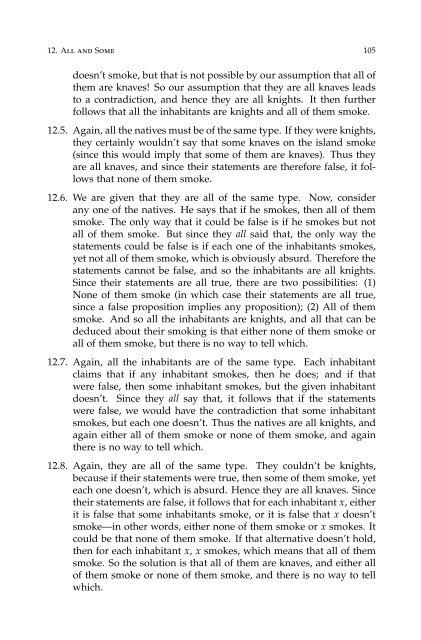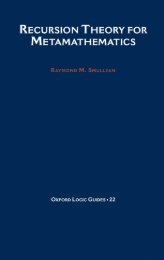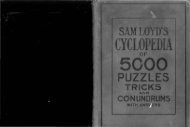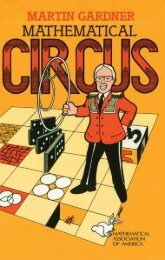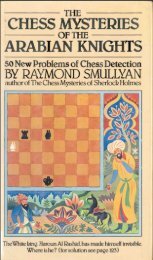Logical Labyrinths
Logical Labyrinths
Logical Labyrinths
Create successful ePaper yourself
Turn your PDF publications into a flip-book with our unique Google optimized e-Paper software.
12. All and Some 105<br />
doesn’t smoke, but that is not possible by our assumption that all of<br />
them are knaves! So our assumption that they are all knaves leads<br />
to a contradiction, and hence they are all knights. It then further<br />
follows that all the inhabitants are knights and all of them smoke.<br />
12.5. Again, all the natives must be of the same type. If they were knights,<br />
they certainly wouldn’t say that some knaves on the island smoke<br />
(since this would imply that some of them are knaves). Thus they<br />
are all knaves, and since their statements are therefore false, it follows<br />
that none of them smoke.<br />
12.6. We are given that they are all of the same type. Now, consider<br />
any one of the natives. He says that if he smokes, then all of them<br />
smoke. The only way that it could be false is if he smokes but not<br />
all of them smoke. But since they all said that, the only way the<br />
statements could be false is if each one of the inhabitants smokes,<br />
yet not all of them smoke, which is obviously absurd. Therefore the<br />
statements cannot be false, and so the inhabitants are all knights.<br />
Since their statements are all true, there are two possibilities: (1)<br />
None of them smoke (in which case their statements are all true,<br />
since a false proposition implies any proposition); (2) All of them<br />
smoke. And so all the inhabitants are knights, and all that can be<br />
deduced about their smoking is that either none of them smoke or<br />
all of them smoke, but there is no way to tell which.<br />
12.7. Again, all the inhabitants are of the same type. Each inhabitant<br />
claims that if any inhabitant smokes, then he does; and if that<br />
were false, then some inhabitant smokes, but the given inhabitant<br />
doesn’t. Since they all say that, it follows that if the statements<br />
were false, we would have the contradiction that some inhabitant<br />
smokes, but each one doesn’t. Thus the natives are all knights, and<br />
again either all of them smoke or none of them smoke, and again<br />
there is no way to tell which.<br />
12.8. Again, they are all of the same type. They couldn’t be knights,<br />
because if their statements were true, then some of them smoke, yet<br />
each one doesn’t, which is absurd. Hence they are all knaves. Since<br />
their statements are false, it follows that for each inhabitant x, either<br />
it is false that some inhabitants smoke, or it is false that x doesn’t<br />
smoke—in other words, either none of them smoke or x smokes. It<br />
could be that none of them smoke. If that alternative doesn’t hold,<br />
then for each inhabitant x, x smokes, which means that all of them<br />
smoke. So the solution is that all of them are knaves, and either all<br />
of them smoke or none of them smoke, and there is no way to tell<br />
which.


